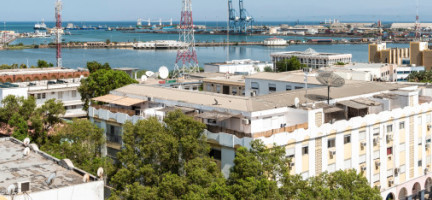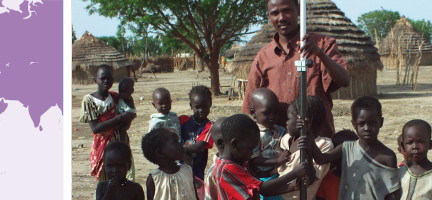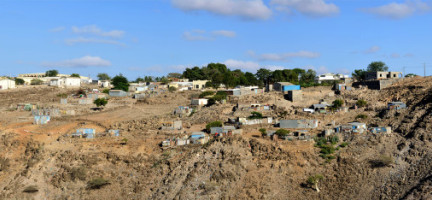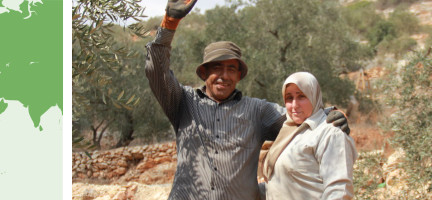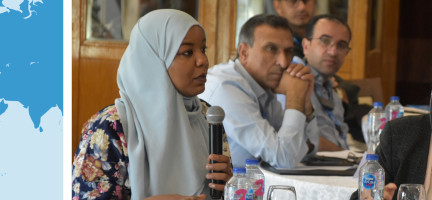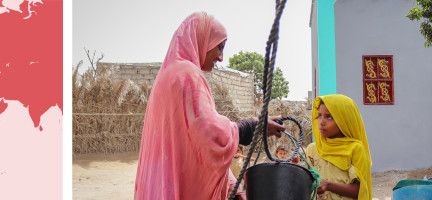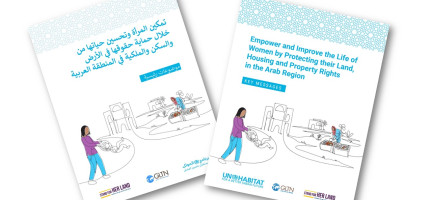Djibouti
The Republic of Djibouti is located in the Horn of Africa. It shares its borders with Eritrea to the North, Somalia to the South, and Ethiopia to the South and West. In spite of its modest size, Djibouti occupies a geographically strategic position on the Red Sea and the Gulf of Aden.
Djibouti has an are area of 23,200 km² and is home to one million people. Around 78 percent of the population lives in urban areas, with the major concentration found in Djibouti city and other nearby urban and peri-urban areas. The remaining quarter of the population lives in rural areas and it is mostly devoted to the traditional transhumant pastoralist lifestyle.[1] Traditionally, the Afar and Issa communities are camels, goats, and sheep herders. The Afar people, primarily residing in Djibouti’s northern region, are part of a larger Afar ethnic group predominantly found in Ethiopia, while the Issa people, concentrated in the southern part of Djibouti, share ethnic ties with neighbouring Somalia.[1] Power sharing struggles between the Issas and Afars led to a civil war that ravaged the country between 1991 and 1994.[2] As of 2018, approximately 25,000 Somali refugees resided in Djibouti.[1]
Djibouti’s topography characterized by rugged mountains in the northern region and a succession of low desert plains separated by parallel plateaus in the western and southern areas.[2] The central and southern parts of the country are predominantly covered by stony deserts, volcanic plateaus, eroded valleys, and shallow saltwater lakes.
Legal and institutional framework
Djibouti’s legal framework is based on a combination of civil law inspired by the French civil code and Islamic law (Shari'a) which primarily regulates family and personal status matters.[2] The primary sources of statutory law include the constitution, laws and decrees and the ratified international treaties and conventions. Customary laws govern rural area, particularly in the traditional pastures inhabited by nomadic pastoralists.
The state has a very predominant role in regulating land-related matters and it formally owns all land.[5] In principle, land management is almost exclusively a responsibility of state institutions. The decentralization process started in the early 2000s has not significantly changed the situation, as the responsibilities of regional authorities with regards to land management are not very clear, although the regional assemblies have some decision making functions with regard to land use and administrering properties under their jurisdiction. [5]
Djibouti’s legal framework is based on a combination of civil law inspired by the French civil code and Islamic law (Shari'a) which primarily regulates family and personal status matters.[2] The primary sources of statutory law include the constitution, laws and decrees and the ratified international treaties and conventions. Customary laws govern rural area, particularly in the traditional pastures inhabited by nomadic pastoralists.
The state has a very predominant role in regulating land-related matters and it formally owns all land.[5] In principle, land management is almost exclusively a responsibility of state institutions. The decentralization process started in the early 2000s has not significantly changed the situation, as the responsibilities of regional authorities with regards to land management are not very clear, although the regional assemblies have some decision making functions with regard to land use and administrering properties under their jurisdiction. [5]
The 1992 Constitution, amended in 2010 recognizes and guarantees the property rights, but does not have provisions on land tenure system and land institutions. Key laws regulating land include Law No 171/AN/91/2nd L that defines anre regulates public lands; Law No 173/AN/91/2nd L that defines and regulates state private domanis and their management. The processes for the management, transaction, and registration of urban, vacant and agricultural lands is described. [1] In 1991, after long years of discussions, several laws were passed by the National Assembly, significantly modifying the functioning of the land sector, particularly within the Djibouti administrative region, one of the six in the country.
‘Vision Djibouti 2035 and its operational action plans define the overall vision, the long-term national development policy and planning framework (Article 1 of Law No. 58/AN/14/7th L).[4]
The institutions with land-related resposnibilities are the Ministry of the Habitat, Planning and Environment, the Ministry of Agriculture, Water, and Fisheries and, to a lesser extent, the Ministry of Interior and the Ministry of Higher Education and Research. The Ministry of the Habitat, the Planning and the Environment is responsible for the implementation of the habitat and housing policies and spatial planning. The Ministry of Agriculture, Water, and Fisheries implements food security, rural development and water policies, is mandated to improve animal production, vegetation coverage and agricultural and agro-pastoralist activities. [1]
The Land Property Commission, chaired by the Secretary General of the Government, gives its opinion on all land-related government decisions and ensures the application of the laws. In 2005, the Land Conservation Department was created, under the Ministry of Finance, to ensure the management and clarify the legal status of public and private State domains, to maximise their use and preserve them.[5]
With the exception of the Djibouti region which is authorized to issue temporary occupancy permits, Public Domain and Land Registry Service and its decentralized offices, under the Finance Ministry, are responsible for the land and properties’ registration. [5] Registrations and transactions must be notarized by a public notary to be legally valid and enforceable. [3]
Djibouti’s legal and institutional framework presents challenges related to the absence of a national land institution responsible for land administration and the inadequate land laws, particularly those concerning land acquisition and resettlement.[1]
Land tenure
Land ownership is regulated by the “Code Foncier”, which governs property ownership, acquisition and expropriation. Access to property is a fundamental and non-discriminatory right. Djibouti’s constitution guarantees and protects the right of ownership for all persons without distinction, including foreigners legally resident in the country. Foreign investors can freely acquire real estate ownership for commercial, industrial and residential purposes, and they enjoy the same rights over the land as nationals.[3]
All land in Djibouti belongs to the state. [3] Article 1 of Law No. 171/AN/91/2nd L provides that public land consists of all property assets, whatever their nature, whether immovable or movable, classified and delimited as belonging to the public domain, whether they areintended for use by the public or not.[1] Private state land includes all lands without owners and lands acquired by the State, from donations, inheritances, or other legal means.[3] There are two categories of private lands: urban and rural.[1] Law No. 177/AN/91/2eL of 10 October 1991 governs land ownership. This establishes a so-called land conservation service, which guarantees the title of property owners by registering the ownership of land and buildings. Deliberation no. 229/7eL of 1972 regulates the relation between landlords and tenants over properties for residential or professional use. [5]
Nomadic pastoralists have customary land rights over their traditional pastures and water points. National tenure legislation favours pastoralists’ land rights over farmers’ rights. “Unlike most African countries where pastoralists are disadvantaged by tenure codes that do not recognize grazing as productive land use, Djibouti upholds (at least does not contradict) the traditional tenure rights and management practices of pastoralists[…]. A portion of the land traditionally used for transhumant herding is assigned to each family within a tribe. This land remains within a family, and sons of successive generations inherit the use rights. If a family has no male heir, the tribal chief may reallocate the land to other families” [1]. As customary land management and conflict resolution mechanisms are functioning fairly well, there is little need to codify or register pastoralists’ grazing rights to their tribal and family-based landholdings. Frequent droughts, desertification, increasing sedentarization and urbanisation contribute to reducing pressure over rural lands.
“Gender issues are acute even by regional standards. The country’s clerics follow a local interpretation of Islamic tradition that differs from Islamic inheritance practices elsewhere in the Muslim world; women do not inherit land or land access. Men own the animal herds as well as the land. Women may possess only a few animals from their dowry”. [1]
Land use and environmental conservation
Urban areas: 150 km2, 0.7%
Forest and other woodland: 57 km2, 0.3%
Arable Land Area: 20 km2, 0.1%
Land under permanent meadows and pastures: 17,000 km2, 73.3%
Water bodies: 20 57 km2
The rural environment is degraded and increasingly desertified; the main causes of it are deforestation caused by the overexploitation of forests by surrounding populations, poor agricultural practices, and overgrazing. [6] Grasslands’ biodiversity is essential to the survival of animals and people, and overgrazing is the main cause of degradation of the plant cover and desertification (Bérubé J. 2000. Etude sur the health of the Forêt du Day). Frequenting the same pastures throughout the year, excessive density of herds and the breakdown of traditional grazing systems are the main contributing factors, reducing the productivity of pastoral lands and the livelihood of pastoral communities, [6] making up a quarter of the Djibouti population.
The Directorate for the Environment was created to strengthen national capacities for environmental management through the promotion of regional participatory environmental planning and management approaches. Regional committees were created to prepare such plans and conduct information and awareness-raising campaigns to bring regional and local players up to speed.[5] Under the Ministry of Agriculture, Livestock and the Sea, the Agriculture and Forestry Service is mandated to conserve the forests within the National Action Program to Combat Desertification. Like the other sectors, it suffers from insufficient human and financial capacities, which constrain implementation on the ground.[6]
Land development
Most land developments take place in the Djibouti metropolitan area and its outskirts. The most widespread land use is residential, followed by commercial and industrial. Unregulated occupation and development of lands is widespread in periurban areas, which leaves no space for road reserves or public facilities.
Temporary land developments are regulated by the law. Unregistered vacant lands that do not have a owner and are outside the development plans can be allocated for temporary occupation by the District Commissioner (Law No 173/AN/91/2nd L, article 19). [1] Temporary concessions for the acquisition and development of rural lands can be issued by the District Commissioner, after consultation with the pertinent administrative services, depending on the proposed development and the local conditions (articles 23 and 24 of Law No 173/AN/91/2nd).[1]
“Under penalty of loss of his rights, the concessionaire should comply strictly with the terms and conditions established in the act of concession and in the specifications annexed to it concerning the development of the land which is the subject of the concession […]. The development of the land should be carried out within the deadline set by the specifications […]. The developers under temporary concessions may be granted ownership of the land plots developed by the conditions stipulated in the act of concession and the specifications annexed to it. However, the plots acquired in full ownership by a developer may not exceed a surface area of one hundred hectares and must have a single holder”.[1]
The Constitution states that the right to property is guaranteed and cannot be infringed "except in the case of public necessity legally established, under reserve of a just and prior indemnity”. [1] Law No. 172/AN/91/2nd L makes provisions for the expropriation of land for public utility, which starts with a declaration of public utility, followed by an order of transferability, followed by the pronouncement of the expropriation and the establishment of a just compensation amount by the Arbitration Board. “The declaration for public utility shall be a decree or an order made by the Council of Ministers, stating public utility operations or work to be undertaken, such as construction works, development, urban works, etc. An administrative investigation always precedes the Act concerning the declaration of public utility. The form and the duration of this inquiry are laid down by the Minister responsible for the areas taken in the Council of Ministers. [1]
Land dispute resolution
Djibouti has civil and criminal courts, the highest of which is the Supreme Court. Land-related conflicts in rural areas are mostly resolved through cusomary dispute resolution mechanisms.
The majority of conflicts occur in urban areas and concerns disputes over plot boundaries, buildings constructed over someone else’s land, and disputes between landlords and tenants.
If disputes regard registered land, they should be resolved in courts. If the disputes are over unregistered land and in the absence of documentation, the contentious is resolved by community leaders or in Sharia courts. The latter is mandated to resolve disputes between landlords and tenants (as per Decree No. 80-012 of January 28, 1980 concerning the administrative reorganization of the Sharia of Djibouti).[5]
Land value and taxation
Land and property taxes in Djibouti have different rates depending on the value of the buildings and non-cultivated land for commercial or industrial use.[3] “The law provides for tax on capital gains realized on property transactions related to buildings or property rights and securities. The law also provides a tax of 25 percent for unconstructed properties where annual tax on undeveloped property concerns all undeveloped land, except for properties that are specifically exempt by law” [1]. Rental incomes are also taxed [1]
Disclaimer
The information contained in this page is based on the body of knowledge developed by UN-Habitat, GLTN and the Arab Land Initiative’s partners. The designations employed and the presentation of the material do not imply the expression of any opinion whatsoever on the part of the Secretariat of the United Nations concerning the legal status of any country, territory, city or area, or of its authorities, or concerning delimitation of its frontiers or boundaries, or regarding its economic system or degree of development. The information may contain inaccuracies due to the data source(s) and do not necessarily reflect the views of UN-Habitat or its governing bodies.
The Djibouti page is still under construction. Share with us any relevant information, resource or correction to enrich our library. Contact the Arab Land Initiative at unhabitat-arablandinitiative@un.org !
